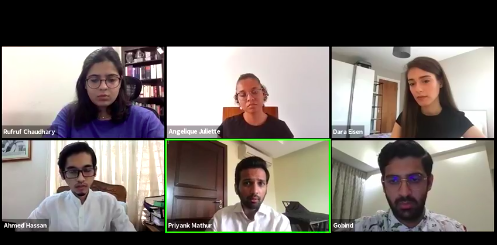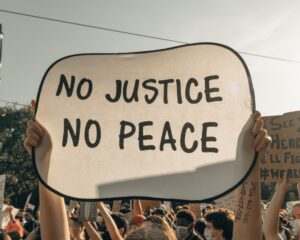
The discussants highlighted the constant tension between the state, society, and the individual in defining both the parameters and perimeter of the notion of ‘freedom of speech and expression’.
27 April 2021 – Freedom of Speech is a constitutional right that is fettered when deemed necessary. A discussion was held on the philosophy of Freedom of Speech and how young law professionals and academics from the United Kingdom, Seychelles, Bangladesh, Malaysia, and Pakistan see the exercise of this Freedom in various jurisdictions. The discussion was hosted by Mazeltov, is the world’s first youth led think-tank on innovation and justice. The participants were connected through an online discussion platform enabled by Mazeltov. Law students and legal fraternity enthusiasts participated in the interactive discussion.
Dara Eisen, a PhD Scholar at Durham University and a researcher in international human rights law and culture participated as a panelist. He also teaches undergraduate classes in public law and United Nations’ security law at Liverpool John Moores University. Eisen argued, based on Mills’ harm principle that the State can justifiably fetter the freedom of speech where the level of harm experienced from offensive hateful expression is objectively extreme.
Dara Eisen was inspired by Fienberg’s journey on a bus, where the audience was invited to imagine a series of offensive scenes on a bus journey ranging from barely offensive to extremely offensive. It is argued that the latter levels of offence would invite regulation. However, she subsequently expresses that due to the overtly subjective nature of offence and harm, there must be flexibility and that it is difficult to determine when the level of offence become so much that it invites regulation. She highlighted that those making these decisions were often the elites in society and that much of human rights discourse in general has been dominated by Western voices. The European necessity and proportionality test were commended. However, she invited listeners to consider how we might ensure those who make these decisions are considering non-Western values as well.
Ahmed Shafquat Hassan, led the discussion from the perspective of a legal academic delving into the discourse surrounding the foundations of Free Speech philosophy. Ahmed Shafquat, a non-practicing Barrister at Law and a research associate at the Centre for Peace and Justice, BRAC University, emphasised on the need for a more equitable lens to view Freedom restrictions. He suggested that if human beings structure themselves in societies that are inevitably unequal, it is imperative that we strive to create equitable structures to counteract the potential harms of dominant narratives that seek to further divide societies and polities.
With that being the overarching philosophy, Shafquat went on to describe the basis of free speech regulations across multiple jurisdictions, focusing on concepts like proportionality used in the European Courts, measuring it up against the values of almost no restrictions under the United States Constitution. He then went on to discuss the implications of these modes of restrictions on political structures and used the works of J.S. Mills, Stanley Fish, Alexander and Horton and Hobbes to explain how the exercise of a principle and a value like Free Speech is used in complement, and in some cases in contravention, to other principles and values like Democracy and Social Justice.
The panelist also included Barrister at Law, Gobind Pannu, who is an accredited mediator and currently working as a paralegal at Bachan & Kartar, a boutique law firm in Malaysia. He started off by showcasing the inability for the freedom of speech to exist on either extreme end of the spectrum. If freedom of speech is to be deemed as an unfettered right without any consequences for what was said, it would lead to turmoil in any country that it is implemented it whereas on the other end of the spectrum, if speech was to be monitored and judged in an Orwellian scenario, it would also ultimately be ineffective in its cause. In his view, freedom of speech should lie in the middle of the spectrum. Thus anyone would have the freedom to speak about what’s on their mind, but that party should also be mindful of the repercussions that said speech might have. He also touched on the importance of art and comedy as a medium to promote discussions on difficult topics, as well as the vitality of the freedom to be heard and to be understood to exist concurrently with the freedom of speech for it truly to be effective in any region across the world.
An accredited mediator with ADR ODR International, Angelique Juliette, currently setting up her mediation practice and legal consultancy in Seychelles. Juliette highlighted that free speech across the continent of Africa is a vital right for its people; this is evidence through the African Charter on Human Rights as well as the continued efforts of its individual countries in ensuring this right is integrated in its democratic and juridical setting. She emphasized that the Charter is seen as a strong proponent of free speech being one that should be protected whether it be online or offline; however, this right is a qualified right and therefore, it goes further to provide limits to which a person can use this right. She identified Africa being a melting pot of different, ethnicities, religions, political viewpoints and other groups, it is imperative that such environment would require a balance between free speech and protecting individuals from hate speech or offensive behaviors. Juliette concluded by saying that how this balance will be achieved remains a dilemma, but Africa should strive to establish its own free speech model that will consider the needs of the African continent.
Lastly, the Founder of Mazeltov, Barrister and Lecturer of Law, Rufruf Chaudhary linked the Freedom of Speech to the Freedom to Access Information. She highlighted that to exercise the Freedom of Speech responsibly individuals need to have access to accurate information from the State to make an informed opinion and statement. Chaudhary also emphasized that legislations need to be redrafted to provide public with a better sense of when their right of Freedom of Speech can be constrained.
Participants from all over the world attended the informative discussion. Justice Refat Ahmed, Supreme Court of Bangladesh (High Court Division) said that “The discussants highlight the constant tension between the state, society and the individual in defining both the parameters and perimeter of the notion of ‘freedom of speech and expression’. A first generation human right is put in the spotlight for scrutiny by a new generation of thinkers informed by contemporary and emergent trends and realities of state building. This is cause for hope that the effort to mold the ever-shifting contours of ‘Rule of Law’ is alive and that such responsibility rests in able hands. The discussion alone is testament enough, and reassuringly so, to the need for such platforms to take that exercise forward effectively.”
Puruesh Chaudhary, Founding CEO Foresight Lab, found the discussion insightful as it ranged from the impact of emerging technologies on free speech, to how would hierarchies of harm are structured and comprehended in different scenarios in different parts of the world. The panelists truly localised their understanding of the challenges deepening the existing knowledge base.
Mazeltov is devoted to developing a global knowledge repository on the human challenges and infrastructure confines. Mazeltov has a comprehensive approach for developing a sustainable harmonized legal system and solutions that can help the legal fraternity around the world. The solutions are developed by examining and debating public policy issues by the experts in respective countries. Mazeltov aims to bridge people, societies and justice by developing innovative practices, policy options and pertained procedures. The organization runs the initiative “Innovation and Justice” to create a global dialogue on novel justice processes, services, platforms, to help nations around the world achieve Sustainable Development Goals.



